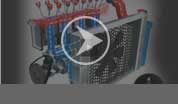VIDEO BLOG
Smart Des Moines Drivers Protect Against Overheating
June 10, 2015Engines get hot when they run. This heat can build up and damage vital engine parts, so engines need a cooling system to keep them running. Cooling system failure is the most common mechanical failure in vehicles. This is unfortunate, because these failures are usually easy for Des Moines auto owners to prevent.
The radiator is the best-known and most recognizable part of the cooling system. Hoses filled with coolant (also known as antifreeze) connect the radiator to the engine. The coolant draws heat from the engine, and then flows to the radiator. Air passing through cooling fins on the radiator cools the coolant. The coolant then cycles back into the engine to start the process over again.
The most critical component of the cooling system, however, is the coolant itself. A mixture of water and coolant/antifreeze helps keep it both from freezing and from boiling away. Either can result in serious engine damage.
Different engines require different types of coolant/antifreeze. The owner’s manual will list what kind a vehicle requires. Using the wrong type or mixing different types of may void the warranty on the cooling system and may damage it as well.
Insufficient coolant can lead to engine failure. Coolant levels need to be checked regularly and topped off as necessary. If coolant levels drop quickly or consistently, the cooling system should be inspected for leaks. Coolant/antifreeze contains additives that protect the radiator and other coolant components from rust, scale and corrosion. Over time, these additives are depleted, so it is necessary for Des Moines auto owners to replace coolant at specified intervals. Changing coolant should be part of routine preventive maintenance for any vehicle.
This service is often ignored, though, since old coolant still cools the engine. Vehicle owners don’t realize there is a problem until the system fails. They are left with major repairs and possibly a damaged engine, which could have been prevented with a cooling system service at Des Moine BDG in Des Moines.
If your minivan sends a warning message to check its coolant or if the temperature gauge is reading in the red or hot zone, then the cooling system needs an automotive analysis. This service is important and should not be put off since the potential for damage is high.
In an emergency situation, water or antifreeze can be added to your minivan so that it can be driven to a service center for proper car care. For this reason, owner’s manual contains instructions for how to top off insufficient coolant – allow 45 minutes for the engine to cool before attempting to add coolant or water. However, the fluid should be added to the coolant overflow bottle, not to the radiator itself. Removing the radiator pressure cap can result in severe burns.
Topping off in an emergency, however, does not fix the problem. The vehicle should immediately be taken to your Des Moines service center or Des Moine BDG where they can inspect the cooling system, repair any leaks, and clean it if necessary. They can identify what caused the emergency situation in the first place and ensure it doesn’t happen again.
Regular maintenance of a vehicle’s cooling system is just good auto advice for Des Moines drivers. Cooling system service is relatively inexpensive and doesn’t take long at Des Moine BDG. Lack of it, however, can put a vehicle in the scrap heap.
Talk to your Des Moine BDG tech for more information.
This entry was posted in Cooling System. Bookmark the permalink.
Easy Miles ‐ Do Des Moines Driving Conditions Affect Service Intervals?
June 3, 2015
Have you ever noticed that your vehicle manufacturer has a schedule in your owner’s manual for what is called “severe service” maintenance? Let’s define what severe driving conditions aren’t: The easiest driving a vehicle experiences is traveling on the interstate for twenty miles or more at a constant rate of 65 miles per hour in 75°F weather with only passengers on board. Change any one of those parameters and you are adding stress to your engine. Change them significantly, and you are driving under severe conditions.
Let’s look at the essential parameters one a time. First, the length of the trip. Short trips around Des Moines are harder on an engine than longer ones. As your engine cools down, water in the air condenses onto the engine. When you heat the engine again, the water evaporates off. This is healthy. But on short trips, the engine doesn’t stay hot enough long enough for all of the water to evaporate so it starts to build up in the engine oil leading to sludge, which can clog up your engine and lead to serious engine damage. If most or all of your trips around Altoona are less than four miles, you should look at using the severe service maintenance schedule. Changing your oil more frequently at Des Moine BDG in Des Moines will help prevent the formation of sludge.
Each minivan engine has a “power band,” or the range of RPM’s in which it runs most efficiently. Generally this power band falls in the range of IA highway speed driving. So if you’re driving around town in Des Moines all the time, your engine has to work harder. That’s why MPG ratings are so much better on the freeway than in the city. Again, this type of driving is considered severe and requires more frequent maintenance for your transmission, cooling system and brake fluid.
Most of us Des Moines auto owners think of severe IA weather conditions when we think of severe driving conditions. And we’re right. Cold Altoona area weather takes its toll on the oil in your vehicle. Remember how water has to evaporate out of the oil to keep your engine healthy? It can take up to ten miles of driving for an engine to get hot enough to get rid of moisture in the oil when the weather is cold.
Hot Des Moines weather is also harmful for minivans. When an engine runs, it gets hot. The longer it runs, the hotter it gets. If it gets too hot, it breaks down. So it has to be constantly cooled to keep running. Hot IA weather means your cooling system has to work harder to keep your engine from getting too hot.
Another critical element of severe driving is the conditions we drive through. Dusty, polluted Des Moines areas are detrimental to your filters. Dirt, dust and contaminants will also get into your fluids, and they’ll get dirty faster, so they’ll need to be changed more often as well. Finally, when you’re pulling a trailer around Des Moines, carrying heavy loads or using a car-top carrier, you are putting more stress on your engine. The engine, transmission and brakes are all working harder to handle the extra load.
So, in the end, most of us Des Moines auto owners drive under severe conditions some of the time. Smart Des Moines drivers will ask themselves the question: “Should I follow the severe service maintenance schedule?” An honest evaluation of our driving habits is the best way to determine which schedule to follow.
This entry was posted in Service Intervals. Bookmark the permalink.
Fuel Injection: It Keeps Getting Better for Des Moines Drivers
June 3, 2015Des Moines auto owners know that engines need to burn fuel to operate. Fuel is pumped from your fuel tank to your minivan engine where it is squirted—or injected—into your engine’s cylinders. This is the function of the fuel injectors.
There are two ways to inject fuel into an engine. Fuel needs air to burn, so in the first method, fuel is injected into a port and allowed to mix with air and before it is drawn into the cylinders. In the second method, fuel is injected directly into the cylinders and mixes with air after it enters the minivan engine.
Direct injection engines burn fuel more efficiently than conventional minivan engines. Some models can deliver the power of a V8 with the economy of a V6.
For example, in one family of engines, the conventional version (a V6) delivers about 250 horsepower. The direct injection version delivers over 300 horsepower and gets about the same gas mileage. The turbocharged version delivers 350 horsepower.
 Why the big difference in power? Direct injection systems allow fuel to be squirted into the minivan engine at hundreds of times the pressure of a conventional engine. This atomizes the fuel better (breaks it down into tinier droplets), which means more of it gets burned, which translates to more power for your engine. It also results in cleaner emissions.
Why the big difference in power? Direct injection systems allow fuel to be squirted into the minivan engine at hundreds of times the pressure of a conventional engine. This atomizes the fuel better (breaks it down into tinier droplets), which means more of it gets burned, which translates to more power for your engine. It also results in cleaner emissions.
Fuel injectors are precision instruments. They have to deliver the right amount of fuel at exactly the time the minivan engine needs it. They are also engineered to inject fuel with a specific spray pattern. This spray pattern allows for maximum fuel efficiency and proper atomization. Direct injection engines require a much higher degree of precision than conventional engines. For this reason, they are equipped with more sophisticated computers.
When fuel injectors get dirty, their precision drops off. The spray pattern won’t be precise, and the timing of fuel delivery may be off. This decreases fuel efficiency and gas mileage as well as delivering less power to the engine.
Des Moines drivers should understand that fuel injectors are not cheap to replace. Direct injection fuel injectors are even more costly. And we’re talking a mortgage payment to buy a set of new fuel injectors for a diesel engine.
So keeping your fuel injectors clean is just good auto advice. The best way to do this is to change your air and fuel filters regularly and practice other habits of good car care and preventive maintenance. Cleaning additives in your fuel can also help.
If you do end up with gum or varnish in your fuel system, you’ll need a professional fuel system cleaning. This will clean out your whole system, including the injectors. The good news is that with proper maintenance, Des Moines auto owners will enjoy better MPG and their fuel injectors will last for a long time.
This entry was posted in Fuel System. Bookmark the permalink.
Hey Des Moines Drivers, How Many Miles Are On Your Car?
May 14, 2015
Nowadays, Des Moines auto owners are paying more at Altoona gas pumps. For some families in the greater Altoona area, it adds up to several hundred dollars every month. That’s got to come out of the budget somewhere. This is one of the reasons many IA drivers are putting off buying a new car. They plan on keeping their old vehicle for a year or two longer than before.
Even now, 2/3 of the personal vehicles on our local Des Moines, IA freeways have over 75,000 miles on them. The average age of vehicles is over nine years. And most people in Altoona can’t afford to be stranded or inconvenienced by a break down. So following a regular maintenance schedule, like personal diet and exercise plans, is actually critical to preserving your investment.
Determining what to do for a higher-mileage vehicle can be challenging because many car maker’s manuals don’t publish service intervals after 60,000 miles. Thus, Des Moines motorists need to be better at keeping records and planning for preventive maintenance.
You can start by figuring that services with a recommended interval should still be performed on that interval, even after you’re past the tables in your service manual. For example, a service might be recommended every 15,000 miles. Well, just keep doing it every 15,000 miles for as long as you have your car.
Now higher mileage engines operate under more stress. Some Altoona automotive experts suggest that the severe service schedule is more appropriate and that routine service should be performed at shorter intervals. Check with your owners’ manual or service advisor at Des Moine BDG to see if the severe service schedule is right for your vehicle.
And keeping current with your full-service oil change schedule is important for a couple of reasons. First, older engines have had more time to build up oil sludge. Skipping an oil change here and there can really compound the problem for your minivan.
Another equally important reason is that your other fluids are routinely checked and topped off. Power steering fluid, brake fluid, coolant and transmission fluid can be kept at optimal levels even though the older seals and gaskets are leaking more than when they were new.
And speaking of older seals and gaskets: they start to dry out and become more brittle with age. You may want to consider using high mileage formulation oil and fluids. These products contain important additives to condition seals and gaskets to keep them from leaking. The high mileage formulations cost more than standard products, but they are well worth it in terms of preventing serious repair bills down the road.
Older vehicles in the Des Moines, IA area need repairs and replacements that newer ones don’t. Things like timing belts, radiator hoses, suspension work, anti-lock brakes, air bags, water pumps, alternators and batteries. That may seem like a lot of stuff to have done, but it works out to be cheaper than new car payments.
With a high-mileage minivan, a couple of relationships will become pretty important to Des Moines motorists. The first is with your service professional at Des Moine BDG. You need someone you trust to take care of your car and be mindful of your needs. Ask for help to develop a plan to keep your vehicle road-worthy that works within your budget, and for the Des Moines, IA area driving conditions.
The next relationship is with your vehicle itself. We’re not talking about naming your car or tucking it in at night. We just mean – pay attention and get to know your vehicle. Notice unusual sounds, smells, vibrations, etc. Then you can describe the changes to yourservice advisor at Des Moine BDG and head off problems. We can’t do anything about the price of gas, but we can properly maintain Old Faithful to keep it safely and economically on the local Des Moines, IA roads.
Take a look at the attached automotive tips video from AutoNetTV.
This entry was posted in Service Intervals. Bookmark the permalink.
Getting the Right Tires And Wheels In Des Moines
May 7, 2015
A lot of people get custom wheels in Des Moines. When you do this yourself (over the internet . . .) you could run into trouble if you’re not careful. Sometimes, once they’re mounted, they just don’t fit right. The tires rub in turns or on bumps. You don’t want that.
Consulting your Des Moine BDG tire professional can ensure you get the right fit. First he’ll ask you a series of questions about your Des Moines driving needs and what you want in your new wheels. Now, not every wheel can go on every car. Care must be taken so that tires and wheels are not too large or that the wheel is centered too far towards the outside or the inside so the tires rub.
If you don’t want to make any modifications to your minivan, you would need to focus on the wheels that would fit. With trucks, some Des Moines people like much bigger tires so they need a suspension lift.
Also, most Des Moines drivers don’t realize that you need to keep the rolling diameter of your new tires – that’s, like the overall height of the tire – very close to what came from the factory in order for your minivan anti-lock brakes and stability control systems to work properly.
The computers that control these systems are calibrated to a certain size tire. When you go bigger or smaller, the computer doesn’t know what changes you made so it can’t tell how fast you’re going. This, of course, means it sends commands to the brakes and traction control that are based on the wrong speed. If you go with a different rolling diameter, your minivan engine control computer can be reprogrammed for the new tire size.
Either way, there are hundreds of wheel and tire choices to choose from in IA. You can pick the style of wheel you want and then talk with your helpful Des Moine BDG tire professional about how big the wheel should be – and how to select the right tire for your minivan. Your Des Moine BDG service advisor will help you find the best tire to meet your style, performance, ride and handling needs in Des Moines.
This entry was posted in Tires and Wheels. Bookmark the permalink.







